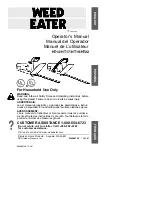
2
SAFETY RULES
IMPORTANT SAFETY INSTRUCTIONS
WARNING: When using electric hedge trim-
mers, basic safety precautions should always
be followed to reduce the risk of fire, electric
shock, and personal injury. Read all instruc-
tions. Be thoroughly familiar with the controls
and the proper use of the equipment.
OPERATOR SAFETY
S
DANGER: Risk of cut. Keep hands away
from blades. Keep both hands on handles
when power is on. Do not attempt to clear
away cut material when blades are in mo-
tion. Make sure trigger switch is not en-
gaged and power source is disconnected
when removing jammed material from
blades. Do not grab or hold unit by blades.
S
WARNING: Do not use without handle
and guard. See Assembly section.
S
Dress
properly.
Always
wear
safety
glasses. Always wear face or dust mask if
operation is dusty. Always wear heavy, long
pants, boots, and gloves.Secure hair so it is
above shoulder length. Do not go barefoot
or wear short pants, sandals, jewelry, loose
clothing, or clothing with loosely hanging
straps, ties, tassels, etc.; they can be
caught in moving parts. Being fully covered
will help protect you from pieces of toxic
plants such as poison ivy thrown by the
blades, which could be more of a hazard
than touching the plant itself.
S
Stay alert. Do not operate unit when you
are tired, ill, or under the influence of alco-
hol, drugs, or medication. Watch what
you are doing. Use common sense.
S
Avoid unintentional starting of unit. Never
carry unit with your finger on trigger switch.
Be sure trigger switch is not engaged be-
fore connecting extension cord.
S
CAUTION: Blades move momentarily after
the trigger switch is released. Allow blades
to stop before removing them from the cut.
S
Wear hearing protection when using unit.
ELECTRICAL SAFETY
S
WARNING: To reduce risk of electrical
shock, avoid dangerous environment. Do
not use on wet hedges or shrubbery, in
damp or wet locations, or around swim-
ming pools, hot tubs, etc. Do not expose
to snow, rain, or water to avoid the possi-
bility of electrical shock.
S
To reduce the risk of electric shock, this ap-
pliance has a polarized plug (one blade is
wider than the other) and will require the
use of a polarized extension cord. The ap-
pliance plug will fit into a polarized exten-
sion cord only one way. If the plug does not
fit fully into the extension cord, reverse the
plug. If the plug still does not fit, obtain a
correct polarized extension cord. A polar-
ized extension cord will require the use of a
polarized wall outlet. This plug will fit into
the polarized wall outlet only one way. If the
plug does not fit fully into the wall outlet, re-
verse the plug. If the plug still does not fit,
contact a qualified electrician to install the
proper wall outlet. Do not change the
equipment plug, extension cord receptacle,
or extension cord plug in any way.
S
WARNING: To reduce the risk of electri-
cal shock, use extension cords specifi-
cally marked as suitable for outdoor
appliances having electrical rating not
less than the rating of the unit. The cord
must be marked with the suffix “WA” (“W”
in Canada). An undersized extension
cord will cause a drop in line voltage re-
sulting in loss of power and overheating.
If in doubt, use the next heavier gauge.
The smaller the gauge number, the
heavier the cord. See Select an Exten-
sion Cord section.
S
Use only a 120 A.C. voltage supply as
shown on the nameplate of unit.
S
Make sure your extension cord is in good
condition.
S
Do not use in the presence of flammable
liquids or gases to avoid creating a fire or
explosion and/or causing damage to unit.
S
Do not attempt to repair unit. Inspect in-
sulation and connectors on unit and ex-
tension cord before each use. If there is
any damage, do not use until damage is
repaired by qualified service personnel.
Do not use a damaged extension cord.
S
Don’t abuse cord. Never carry unit by
cord or yank cord to disconnect unit.
S
To reduce the possibility of extension
cord disconnecting from unit during oper-
ation, attach extension cord to cord re-
tainer on unit. See illustration in Select an
Extension Cord section.
S
Do not use unit if the trigger switch does
not turn the unit on and off properly. Re-
pairs to the switch must be made by quali-
fied service personnel.
S
Keep the extension cord clear of the op-
erator, blades, and obstacles at all times.
Do not expose cords to heat, oil, water, or
sharp edges.
S
Avoid body contact with any grounded con-
ductor, such as metal pipes or wire fences,
to avoid the possibility of electric shock.
UNIT SAFETY
S
Ground Fault Circuit Interrupter (
GFCI
)
protection should be provided on the cir-
cuit or outlet to be used for the hedge
























